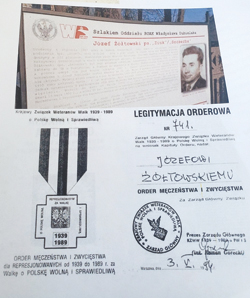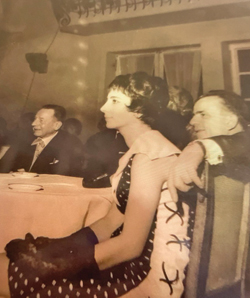Resident recounts family struggles in Poland under communism
by Laura Bednar
Living under Nazi occupation and later Soviet communism in her home country of Poland, Independence resident Christine Zimon experienced violence and tragedy, later learning of her father’s bravery when fighting for a free and fair country.
Zimon was born in Poland in 1937, two years before World War II began. In 1939, Germans were bombing the country, leaving Zimon’s family, which included her parents and four sisters, to hide in a bunker. While hiding, the family had no blankets or food, and Zimon developed diphtheria. Her grandmother risked leaving the bunker to bring back kerosene for Zimon, saving her life. At that time, swabbing the throat with kerosene was a common home cure for diphtheria.
Zimon’s father, Jozef Zoltowski, was a member of the Polish Home Army, an underground resistance that fought for Poland’s freedom from Nazi occupation during the war and Soviet communists after the war. In an article Zimon’s sister Kalina wrote, she said Zoltowski was frequently assigned to dangerous actions in Plock, Poland, and was responsible for the security of weapon magazines in the city and villages.
In 1946, Soviets came to the family’s home in the Polish town of Gabin, and arrested Zoltowski for his involvement with the resistance. His court hearings lasted 10 months, with a trial occurring in August 1947. During his time in prison, Zoltowski was tortured in unthinkable ways as Soviet communists beat him, submerged him in water up to his neck and froze him, and put a hole in his chest attempting to fill his lungs with water.
Though tortured, Zoltowski would not surrender any information about the Home Army, its members or strategies. The trial ended in September 1947, but was resumed after the Military District Prosecutor in Warsaw lodged an appeal with the Supreme Military Court. The court referred the case for reconsideration and said Zoltowski would be held in pre-trial detention.
To avoid returning to prison, Zoltowski went into hiding. During this time, Soviet communists regularly came to Zimon’s family restaurant and residence, searching for him and ammunition by cutting open feather blankets and ransacking the area.
Zimon said during one of the searches, her mother was arrested. She yelled at the communists not to take her mother, and the soldiers closed her in a door until she screamed in pain. She was 14. Zimon’s mother was kept in a basement for two weeks, given only bread and black coffee. She was only released when she caught pneumonia and a doctor said she was on the brink of death.
At that time, Zimon was at home with two of her sisters and her grandmother. Her two older sisters were teachers and the communists dictated where they taught. While her mother was in jail, she asked an aunt who lived nearby for food, but was refused due to fear the communists would come for her, too.
“Everybody was scared,” Zimon said.
She recalled being bullied in school because of her father’s arrest. Even worse, she gave an example of the horrific actions by the Soviet communists, stating that she, her sister and grandmother, along with other females in the town, were forced to watch as Polish natives were told to dig holes and were then shot, falling into their own graves.
Her family’s restaurant in Gabin closed after Soviets continually ransacked it, stealing supplies. To support the family, Zimon’s mother learned from her grandfather how to make shoes and sold them in other towns.
While her father was in hiding, he would meet with Zimon’s mother secretly. On his way to a meeting place, he stopped overnight at a friend’s house and stayed in the barn. The homeowner’s neighbor came over, and he told the neighbor about Zoltowski in secret. The neighbor was an informant and told the militia about Zoltowski’s whereabouts.
Zimon said the communists tied her father to the back of their Jeep and dragged him back to jail. He was sentenced to prison in 1950 and was not released until March 1954. Due to the many tortures he withstood, he collectively spent a year and a half in the hospital before dying in 1956.
After finishing high school, Zimon became a beautician, graduating from beauty school in 1956. She worked in Warsaw and created artistic hairdos. When beautician professors from Paris came to a show in Warsaw, they were impressed with Zimon’s abilities and invited her to L’Oreal in Paris for six months to practice her craft.
Her time in Paris was cut short when she took a trip with her uncle to America in 1964. What was to be a vacation turned into her permanent home when she met her now husband Andrew Zimon during her trip.
The two were married in 1965 and have two children and four grandchildren. Zimon said she and her husband have lived in Independence for 48 years, are active with the seniors group and have volunteered within the community.
Once in America, Zimon worked for Higbee’s department store in cosmetics. Her accomplishments in cosmetics and beautician diplomas are on display in a museum of remembrance in Gabin, Poland, alongside her father’s Order Cards, recognizing his devotion to the Polish Underground during the occupation. The card stated that Zoltowski fought for a free and fair Poland, and honored his “martyrdom and victory.”
A letter from Zoltowski’s commander read in part, “Your father acted with dignity like a true Pole and patriot. He remained faithful to the soldier and Home Army Oath until the end of his unbroken and tragic life. He was a true hero.” Despite the tribulations Zimon experienced in Poland, she said, “I have become a stronger woman through it all; I’m fearless like my father.”

and order card of “martyrdom and victory” from the national
union of combat veterans in Poland, recognizing his
service with the Home Army. Photos submitted.

with a beautician professor.
